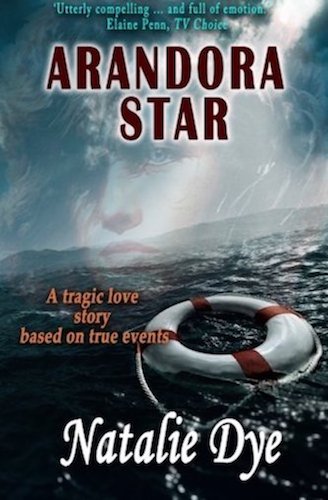VICTIMS OUT OF NECESSITY
In the porch of St Peter’s Italian Church on London’s Clerkenwell Road are two memorials, one commemorates the British and Italian soldiers killed in the first World War, while the other is dedicated to the victims of one of the most shameful episodes of World War 2. In July 1940 a German torpedo sank the Arandora Star in the Atlantic and while the downing of an unprotected civilian ship had little if any impact on the course of the war, it is the tragic scar that runs through the family of author Natalie Dye. It is also the basis of the powerful first novel that takes its name from the doomed vessel.
Dye’s narrative is built around the relationship between Lilly Jones, a young English woman trapped in an abusive marriage, who falls in love with widower Antonio Antonelli, the son of an Italian café owner. When Lilly is raped by her husband (a repressed homosexual), she courageously walks out on him, unaware that her defiance will provoke him into an horrific act of malice that will have fatal consequences for everyone.
After Italy’s Fascist dictator Benito Mussolini joins forces with Germany’s Adolf Hitler, it is the cue for Winston Churchill’s government to order the arrest and internment of thousands of Italians living in Britain. Classified as a threat to national security hundreds of men, some barely out of their teens, were rounded up and placed in filthy, makeshift camps across the country. Antonio is caught in the sweep and along with innocent Austrian, German and Jewish internees, is forced to board the Arandora Star for imprisonment in St John’s Newfoundland, a former British colony in Canada. The boat never made it and the rest is history.
Nathalie Dye’s novel evokes intense feelings of outrage, disbelief, and utter sadness. It is almost inconceivable that a government would greenlight the arrest of ordinary, hard-working citizens whose only crime was their nationality. Yet in a climate of heightened tension it was predictable, although that doesn’t forgive the most obvious oversight: those whose names were on MI5’s hit list had either left Italy after the First World War or had recently fled their homeland to escape Fascism! Their adopted country failed them in the worst possible way and it was left to the survivors, friends, and families of the victims to clear up the emotional mess. In Lily’s case that meant moving to Italy where the Antonelli family embraced her as one of their own.
Natalie Dye’s pin-point research has produced sympathetic characters who are believable in their plight and a narrative that flows easily with every page. My one complaint, and it’s a minor one, is that the dialogue between Lilly and Antonio occasionally felt stilted. That aside this is a novel that should be read by anyone who wants to understand the human cost of war and how the consequences from a spiteful gesture can resonate across the decades.
Arandora Star is a poignant tribute to the victims and specifically to Giovanni Tambini, the author’s grand-father in law whose widow was left to raise their four young children.
Reviewed by Juliette Foster
© Archant Community Media Limited used under limited licence




